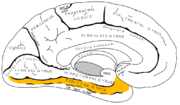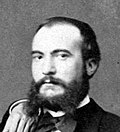The fusiform face area (FFA, meaning spindle-shaped face area) is a part of the human visual system (while also activated in people blind from birth)...
24 KB (3,120 words) - 19:45, 9 November 2023
in this area and it is sometimes referred to as the fusiform face area (FFA) for that reason. It is important to note that while certain areas of the brain...
122 KB (14,542 words) - 10:22, 14 October 2024
fusiform gyrus, also known as the lateral occipitotemporal gyrus, is part of the temporal lobe and occipital lobe in Brodmann area 37. The fusiform gyrus...
18 KB (1,969 words) - 04:51, 15 May 2024
aneurysm Fusiform bacteria (spindled rods, that is, fusiform bacilli), such as the Fusobacteriota Fusiform cell (biology) Fusiform face area, a part of...
2 KB (195 words) - 02:54, 28 June 2024
stimuli. The face is the feature which best distinguishes a person. Specialized regions of the human brain, such as the fusiform face area (FFA), enable...
32 KB (3,221 words) - 23:01, 5 October 2024
Visual processing (section Fusiform Face Area (FFA))
whereas the fusiform face area (FFA) responds mostly strongly to faces and face-like stimuli (Kanwisher et al., 1997). The parahippocampal place area (PPA)...
15 KB (2,054 words) - 22:22, 27 October 2024
the cortex) and then finding an area well known for its modularity such as the fusiform face area. This landmark area then serves to orient the researcher...
33 KB (4,453 words) - 03:52, 21 November 2024
Brodmann area 37, or BA37, is part of the temporal cortex in the human brain. It contains the fusiform gyrus which in turn contains the fusiform face area, an...
2 KB (158 words) - 18:00, 25 September 2024
Prosopometamorphopsia (redirect from Demon face syndrome)
STS rather than the fusiform face area. Other studies, however, have found that stimulation of the posterior and mid-fusiform face selective regions in...
13 KB (1,607 words) - 02:29, 21 September 2024
Prosopagnosia (redirect from Face blindness)
2.5%. The brain area usually associated with prosopagnosia is the fusiform gyrus, which activates specifically in response to faces. The functionality...
47 KB (5,331 words) - 08:25, 23 October 2024
body area (EBA), which perceives bodies in relation body parts, and the fusiform face area (FFA), which is involved in the perception of faces. Marius...
12 KB (1,495 words) - 03:32, 17 August 2024
gyrus. The OFA comprises a network of brain regions including the fusiform face area (FFA) and posterior superior temporal sulcus (STS) which support facial...
11 KB (1,276 words) - 21:19, 12 September 2024
parts, akin in its respective domain to the fusiform face area, involved in the perception of human faces. The EBA was identified in 2001 by the team...
7 KB (947 words) - 15:18, 25 September 2024
Emotion perception (section Fusiform face area)
areas suspected of being involved in the processing of faces and emotional information. The fusiform face area, part of the fusiform gyrus is an area...
47 KB (5,711 words) - 05:32, 11 November 2024
Receptive field (section Extrastriate visual areas)
radial gratings or hands. It is also believed that in the fusiform face area, images of faces excite the cortex more than other images. This property was...
22 KB (3,001 words) - 22:20, 12 June 2024
Faces are normally processed in the special face-selective regions of the brain, such as the fusiform face area. However, processing inverted faces involves...
27 KB (3,417 words) - 02:54, 19 March 2024
misfiring in the fusiform face area of the brain, which recognizes faces, and in the amygdalae, which associate emotions to a recognized face. The neural disconnection...
21 KB (2,358 words) - 17:17, 24 September 2024
memorizing faces than non-faces. There are several areas of the brain associated with the highly specialized form of memory for faces. The fusiform face area (FFA)...
33 KB (3,943 words) - 01:50, 7 June 2024
Greeble (psychology) (category Face perception)
their ability to recognize faces and objects, and that the fusiform face area is not strictly used for recognizing human faces. Gauthier, Tarr (1997), p...
18 KB (1,699 words) - 11:54, 5 February 2024
form area (VWFA) is a functional region of the left fusiform gyrus and surrounding cortex (right-hand side being part of the fusiform face area) that...
16 KB (1,980 words) - 18:33, 29 October 2023
Kanwisher, Nancy (1997-06-01). "The Fusiform Face Area: A Module in Human Extrastriate Cortex Specialized for Face Perception" (PDF). The Journal of Neuroscience...
15 KB (1,064 words) - 04:55, 21 November 2024
and may be involved in prosocial behavior. The fusiform face area (FFA) is strongly associated with face processing and perceptual expertise. The FFA has...
43 KB (4,761 words) - 12:10, 1 September 2024
Parahippocampal gyrus (redirect from Parahippocampal place area)
the fusiform face area (FFA), a nearby cortical region that responds strongly whenever faces are viewed, and that is believed to be important for face recognition...
8 KB (781 words) - 10:52, 29 April 2023
Prosopagnosia (inability to recognize faces) is due to damage of the fusiform face area (FFA). An area in the fusiform gyrus of the temporal lobe that has...
23 KB (3,017 words) - 04:02, 13 October 2024
appropriate context. Fusiform Face Area The Fusiform face area (FFA) is an area that has been studied to be highly active when faces are being attended...
24 KB (2,779 words) - 21:36, 21 November 2024
Pareidolia (redirect from Face pareidolia)
as faces. A 2009 magnetoencephalography study found that objects perceived as faces evoke an early (165 ms) activation of the fusiform face area at a...
42 KB (4,418 words) - 13:32, 12 November 2024
usually occurs as a result of the fusiform face area—which is the part of the human brain responsible for seeing faces—mistakenly interpreting an object...
14 KB (1,510 words) - 07:28, 11 November 2024
Super recogniser (category Face perception)
science behind this is poorly understood but may be related to the fusiform face area part of the brain. The skill is recognised and employed among the...
9 KB (808 words) - 07:38, 28 February 2024
high-functioning autism had reduced activity in the fusiform face area when viewing pictures of faces.[verification needed] ASD could be linked to mitochondrial...
56 KB (6,079 words) - 00:37, 16 November 2024
Neuroanatomy of handedness (section Face processing)
forced group. The Fusiform Face area is an area typically unilaterally, much like the language areas, and localized on the right fusiform gyrus. However...
16 KB (1,936 words) - 07:13, 8 May 2024














